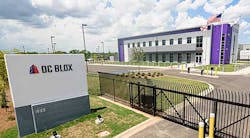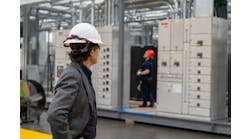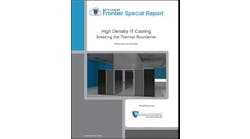Investors are increasingly looking to fund data center growth in smaller cities like Chattanooga and Greenville as well as the huge cloud clusters in Northern Virginia and other major markets. The growing confidence in second-tier markets reflects investor interest in the growth of edge computing and the pandemic-driven reality that data is important everywhere.
In the latest deal, DC BLOX has lined up $187 million in long-term financing to continue expanding its data center network. The investment is led by Post Road Group and Bain Capital Credit, and will support help the Atlanta-based provider expand its network of facilities across the Southeastern U.S.
“Edge computing, storage, and connectivity aggregation points are increasingly pushing outside of major metropolitan areas,” said Brian Hirschfeld, a Managing Director at Bain Capital Credit. “DC BLOX is well-positioned to capitalize on this expansion and deliver a state-of-the-art data center network to smaller markets.”
The DC BLOX financing follows a $687 million funding for DataBank, another regional data center specialist. The deals indicate that investors are now looking beyond major markets and hyperscale data centers, which have received the lion’s share of investment amid strong demand for cloud computing services. The growing confidence in business models targeting second-tier markets is making it easier for regional operators to raise capital for expansion.
Right-Sizing Data Centers for Edge Computing
DC BLOX operates data center campuses in Atlanta; Chattanooga, Tennessee; and Birmingham and Huntsville in Alabama, with a fifth site underway in Greenville, South Carolina. Its roadmap includes plans for data centers in 15 more cities across the Southeastern US, including regional business centers like Charlotte, Charleston, Nashville and Louisville but also smaller markets like Jackson, Mississippi and Columbia, South Carolina.
The company builds Tier III data centers with a modular design and lean construction methods, employing precast components. It’s a design strategy suited to its business model. As data moves to the edge of the network, data centers are being right-sized to fit the demands of smaller markets, deploying space in digestible chunks. The 50-megawatt “aircraft carrier” data centers seen in major Internet hubs and cloud campuses are poorly suited to local markets, where the requirements will be considerably smaller.
DC BLOX employs “building block” designs that can be deployed in chunks of capacity as small as 3,350 square feet. Each data center is interconnected with DC BLOX’s high-speed, fiber-optic network, which enables a variety of use cases, including business continuity, disaster recovery, content delivery, IoT and mobile applications.
That trend is also seen in the new edge computing design by Equinix, the world’s largest colocation provider, which uses factory-built modules to add capacity in smaller increments. The new design is being deployed for the first time in a cable landing station in Bordeaux, France.
Strategic Growth Opportunities Reach Smaller Cities
DC BLOX describes itself as a “unique pure-play data center operator focused on underserved growing cities. Private equity firm Post Road Group has been working with DC Blox for four years.
“We’ve worked extensively with their world-class management team and enthusiastically support their strategy to bring superior data centers, connectivity, and storage infrastructure to growing Edge markets,” said Michael Bogdan, Managing Partner of Post Road Group.
The company will use the $187 million to refinance existing debt and invests in new data center capacity. CEO Jeff Uphues said the funding is ” a significant milestone” for the company. “The trust and partnership we have developed with the teams at Post Road Group and now with Bain Capital Credit are instrumental to our continued growth plans,” said Uphues.
In targeting underserved markets in the Southeast, DC BLOX is updating a strategy that has worked before for regional players, most notably Peak 10, which built a network of medium-sized data centers across the Southeast before merging with ViaWest to create a national platform with Flexential.
Building data centers is a capital-intensive business, and after raising $98 million in previous rounds, DC BLOX is positioned to raise larger amounts of money to support its growth. Investment banking firm DH Capital, which has lengthy experience in the data center and hosting sector, serves as financial advisor to DC BLOX.
As we noted last week, we are seeing the emergence of the business edge, as stakeholders in distributed computing step up their investment and deploy real-world edge infrastructure. This trend has gained momentum in recent months, as growing customer interest validates business models and partnerships.
In recent years, global investors are raising billions of dollars to invest in digital infrastructure, citing extraordinary demand for capital to fuel the data economy. Their initial focus was the growth of hyperscale computing, where the tenant is a giant corporation with excellent credit, lowering the risk profile for investors. As capital continues to seek opportunities in digital infrastructure, these recent fundings suggest investment will ripple out from the core towards the edge.






